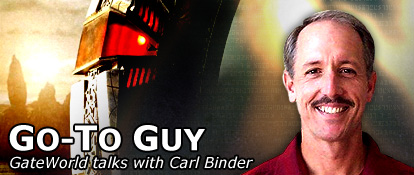
Before he joined that Stargate team, writer Carl Binder helped to deliver to the small screen such shows as Dr. Quinn, Medicine Woman, Little Men, and Mysterious Ways. When his old friend Brad Wright created Stargate Atlantis, he tapped Binder — who quickly became one of the show’s most reliable writers.
As the one who is often called upon to write the teleplay based on ideas pitched by other people, Carl is Atlantis‘s “go-to guy.” In our interview he talks about that role, and about his excitement over having his own ideas make it to the screen — including the new Season Three episode “The Real World.” He also shares his insights into learning to tell stories in a genre he wasn’t familiar with, and in pitching ideas to a team that has already produced over 240 episodes of Stargate.
GateWorld’s interview with Carl Binder is available in MP3 audio format for easy listening, and is about 18 minutes long. It is also transcribed below. You can also download the interview to your MP3 player and take GateWorld with you!
GateWorld: For GateWorld.net, I’m Darren Sumner. I’m here with Carl Binder, writer for Stargate Atlantis.
Carl Binder: Yes.
GW: This is your second year full time on the show. Tell us a little bit about what brought you to this office.
CB: Well, simply put, what brought me to this office was Brad Wright. He and I worked together several years ago on a series called Neon Rider. We were both starting out in the industry, both story editors on that show. Then he went off one way, I went off another, and [we] sort of forged our own path. He created this whole franchise, and about a couple years ago he told me that they were going to do this spin-off of Stargate, and [asked] is it something I would be interested in?
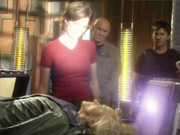
Though science fiction was not necessarily Carl’s bread and butter, he has found ways to make his ideas work. From “The Long Goodbye”
So he sent me the pilot for the “Rising” episode — the pilot for Atlantis. I read it and I said — I’m not really a science fiction writer, so I said, “It sounds really interesting. I don’t know if I can do it, but let me give it a shot by doing a freelance episode.” So I came up with some ideas. I pitched one of them, which then became the “Before I Sleep” episode.
So they flew me up. We broke the story in the writer’s room. I went off and wrote that and it came out pretty good. So he then called me and said “Can you do another?” So I did “Letters from Pegasus” And after I did that script he called and said, “Do you want to come on the show?” I said, “Great!”
So here I am. Obviously I owe my thanks to him because I don’t think anyone would hire me on a science fiction show, because I don’t have a science fiction pedigree.
GW: Your background is shows like Dr. Quinn. Is that right?
CB: Dr. Quinn. Before Dr. Quinn I did the movie “Pocahontas” for Disney. Then after that I created and developed two shows for the PAX network. One called Little Men which is kind of like a Dr. Quinn, 1800’s-era show. And then I did a show called Mysterious Ways for PAX and NBC. It was on NBC for a while there, too. We did 44 episodes of that. So I’ve done a little bit of everything.
GW: So as an industry veteran coming on to a genre show, tell us a little bit about the challenges of learning to write science fiction every day?
CB: Well, it was terrifying, actually, because I came on to the show last year. The first episode I wrote — it wasn’t the first episode that was produced of mine — but the first script that I wrote coming on staff was “Aurora,” which was an idea that Brad had pitched to me. I worked it out and turned in a first draft … and everyone hated it. [Laughter] We had a rather long note session and then, “OK, alright. Now I’m getting it. Now I’m getting it.”
So I did the next draft, which went over quite well. And then my next script, “Condemned,” was received a little bit better. As Robert said when I started, because in the first month I was walking around here like a zombie, reading these scripts, this kind of glazed-over look on my face, he said: “You’ll feel overwhelmed, and then at a certain point you’ll be absorbed in the world and you’ll start thinking within the world.” If you’re a storyteller you’re a storyteller, and then you just adapt that storytelling skill to the genre — to the world that you’re in.
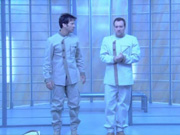
“Aurora” was one of his early dips into the world of Atlantis, and was met with varying success at its different stages.
So, ultimately I still feel a bit of a fish out of water in that sometimes when I sit in there with them and they’re talking ideas and bouncing around ideas I feel like I’m 10, 20 steps behind them, and have to come in here afterwards and sort of go, “What were they … OK, OK …” Slowly. I still feel a little bit behind but I’m feeling much more comfortable in the world this year than last year.
GW: Well, you must be. You have four scripts done, or you’re working on your fourth.
CB: Yeah, I ended up doing six last year, which was a lot — for me, anyway. I’ve already done three and I’m starting on my fourth right now. It’s a lot.
GW: Almost a sixth of everything!
CB: Yeah, yeah.
GW: It’s kind of nice that you got into this Stargate ballgame in the first season of Atlantis, but, then again, you’ve got seven-plus years previous of franchise history. Did you have to do any kind of a crash course on this universe?
CB: Yes. Well, actually I wrote an episode in the third season called “Demons.” It was right after I finished Dr. Quinn and before going on to do the show Little Men. Brad said, “Do you have time to do a freelance episode?” So I said, “Sure.”
So I did the big crash course. Then he sent me the stack of all the episodes that they’ve done, and the mythology. It’s very overwhelming. Now coming in, the thing about Atlantis is it’s still a part of the Stargate mythology, the Stargate universe, but in a way it’s a new show starting off. So it’s a little bit easier. Writing for SG-1 would be much more difficult because of the 200 episodes preceding.
Even these guys, they’ll go, “Wait a minute. What was that episode? Didn’t we do that?” When somebody pitches a story angle or scene. “Wait a minute, that’s very much like the scene we did in so-and-so.” And that’s, I think, the specific reason why Brad brought me on to Atlantis instead of saying, “Come on and do SG-1.”
GW: Well, with 240 some-odd stories out there between the two shows, is it a particular challenge to get a pitch in there that goes through?
CB: Always. It’s terrifying. Like when I was pitching the first, which then became “Before I Sleep,” the idea that I pitched was quite a bit different from what eventually the story turned out to be. But it involved an older Weir — them discovering an older Weir inside Atlantis. The reasons behind it were different.
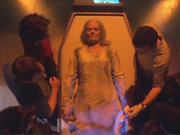
There are only a limited number of concepts in science fiction, making it difficult to generate a new story.
But going off to think of a new idea, you’re constantly going, “Oh, wait a minute. They’ve done that. They’ve done that. OK, they’ve done that, but is there a fresh new way …” Because, you know, ultimately there’s very few kind[s] of story types. In science fiction they’re always saying, “That’s this kind of story or that kind of story.”
I tend to gravitate toward the character stories, smaller episodes. Not the big, huge run-and-jump kind of episodes. So I’m always trying to think of stories along those lines. Start from the personal. I like moral dilemmas so I tend to start from the character, and what kind of moral dilemma. And then rely on them to come in with the more science fiction, technical aspect to it.
But yes, the answer to the question is it’s really, really difficult. It’s really difficult for writers who come in to pitch. We sit in on a lot of pitches. They start pitching and Brad, within 20 seconds, goes, “We’ve had that pitch a thousand times.” Or “We did that story.” And you just think, “How does anyone come up with anything new or different?” It gets harder and harder.
GW: The trappings of such a successful franchise.
CB: Yep. Yep. And ultimately sometimes you do well. “OK, this is similar to a story that we did before but what’s new about this is we’re telling it from this angle or with this character.” Yep.
GW: Tell us a little bit about what is coming so far in Season Three. Have you had a good opportunity to write those character moments, those moral, ethical dilemmas?
CB: Yeah, actually. The three that I’ve done, there’s one, a very personal episode about Dr. Weir, in which she is thrown into a very unusual and disturbing circumstance. It’s a very intimate episode about her, which I’ve really enjoyed, and I enjoyed because it was an episode that I pitched! [Laughter] Because last year, pretty much, all of them that I wrote were stories that were generated by Brad or Robert, who said, “I have this idea. Why don’t you run with it?”
GW: Just the go-to guy there.
CB: Yeah. So then I would go off and I would flesh it out and then give them the beats, and they’d make adjustments. Like “Critical Mass,” Brad said, “What if there was a bomb on Atlantis and we knew it? And it’s about figuring out how to dismantle it before it goes off.” OK, from that pitch let’s layer in the rest of it. And that’s pretty much how all of them came about.
This year, this one that I’m starting now, the fourth episode, and the Weir episode, were two that I came in and pitched. So I’m very proud of the fact that two ideas that were generated by me are making it. And this one, we get into some back story about Sheppard. So that’s good. I’m enjoying that.
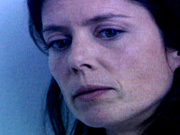
“The Real World” will show viewers a different side of Dr. Elizabeth Weir.
While the Weir story is part of — we’re doing this introducing of a new villain into the show. It’s not really a two-parter, but it’s two episodes that will air back-to-back in which one leads into the other. But I think they both stand on their own as two separate episodes, the second of which is the Weir story that I was talking about.
And then the third one, which we’re shooting right now. I don’t know if you’ve been down to the set to see Richard Kind?
GW: No, not yet. We haven’t seen it yet, but we know about it. A little.
CB: Yeah, he’s guesting in an episode. It’s a lighter one.
GW: This is “Irresistible?”
CB: Yeah, yeah. I think it was Robert who first pitched it to the group, and then Brad was going to write it but was too busy with everything else. He then passed it off to me. So I wrote the teleplay for it and then Brad did his pass that just punched up the humor. Especially the main character. And it’s just a lot of fun. The cast is having a great time doing it. So we’re all looking forward to that one.
So that was nice, because the last few episodes that I’ve done have been pretty heavy and serious. It was nice to do one which is more of a lighter, fun episode.
GW: Will the Weir episode give us a chance to see Elizabeth when she’s away from her job, see what she’s like — not just her backstory and her past, but her presence in life when she’s not in the control tower?
CB: Yes. We will very much get to see Dr. Weir in a different environment, and a different side of her.
GW: That’s needed.
CB: Yeah! Yeah. I think that now is the time we’re going to start seeing more. That’s what I love about this season so far. We’re doing some episodes where we’re going to really see some additional layers to our characters. Martin wrote a great McKay episode that’s coming up where we learn more about his family and his relationships. A little bit more of what makes him tick, which will be great. He does the great McKay episodes. [Laughter]
GW: Excellent. So which is your favorite so far, either of the ones that you’ve written or the ones that have come from the other guys in the office?
CB: Well, you’ll see a pattern developing in my favorite episodes. I really liked, from last year, I really liked “Duet.” I really liked “Grace Under Pressure.” Of the ones I did, my favorites were “Michael” and “Critical Mass.”
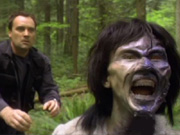
“Instinct,” a character story, is one of Carl’s favorite episodes from Season Two.
I like those episodes that are more about character and more of the personal kinds of episodes. And I would say they were my favorites. I really liked “Instinct.” [I] thought that was a really interesting episode. The first of the retrovirus episodes.
GW: It became a very significant, ongoing plot point in Season Two. Is that persistent in Season Three?
CB: Partially. We have to tie up some loose ends.
GW: Well, many fans are wondering if we will be meeting the creators of the “Hot Zone” virus a year and a half after they were hinted at back in Season One. Can you shed any light on this?
CB: Yes, there’s a good chance we will find out who is responsible for it.
GW: Does it have anything to do with that Weir story?
CB: You know what, let’s just leave it at that. [Laughter] It’s always that juggling act. How much to say, how much to give away?
GW: The mystery will be revealed, though.
CB: Yeah.
GW: Good. With the Wraith now fighting amongst themselves in their civil war, Earth has all these battleships. We have the Orion, the Ancient warship. How big of a threat would you say that the Wraith still are to us in the new season?
CB: They are still a very big threat, and will continue to be a very big threat. As I said, we’re introducing a new villain which makes things even more problematic for us. But they’re nowhere close to being defeated. Yet. [Laughter]
GW: Is there one story that you’ve been bouncing around in your mind that you haven’t gotten to tell in the Stargate universe yet?
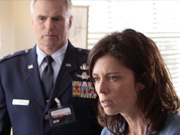
“The Real World” didn’t have a context to be told until Season Three.
CB: No, no. Because the one that I did want to do, which is that Weir one that I was telling about, I actually pitched to Brad last year. And he said, “OK, it’s interesting, but we’re not ready for it yet.” And so I didn’t know if that he was his polite way of saying —
GW: — buzz off?
CB: — Not a good idea! [Laughter] So this year, at the beginning of the season when we all gathered again, everybody was saying, “What are your ideas?” “What are your ideas?” They got to me and I said, “Well, I’d really like to do that one that I pitched last year.” And this time they were like, “OK.” And we now have a context in which we can tell that story that we didn’t have last year.
GW: Probably why he held it off.
CB: Probably. He’s got it all in his head. He knows when the right time is for each. Sometimes you’ll want to do something and he’ll say, “No, not yet.” And you go, “OK.” Trust that he’s got it this far. Ten seasons of SG-1, three of Atlantis. He knows what he’s doing.

